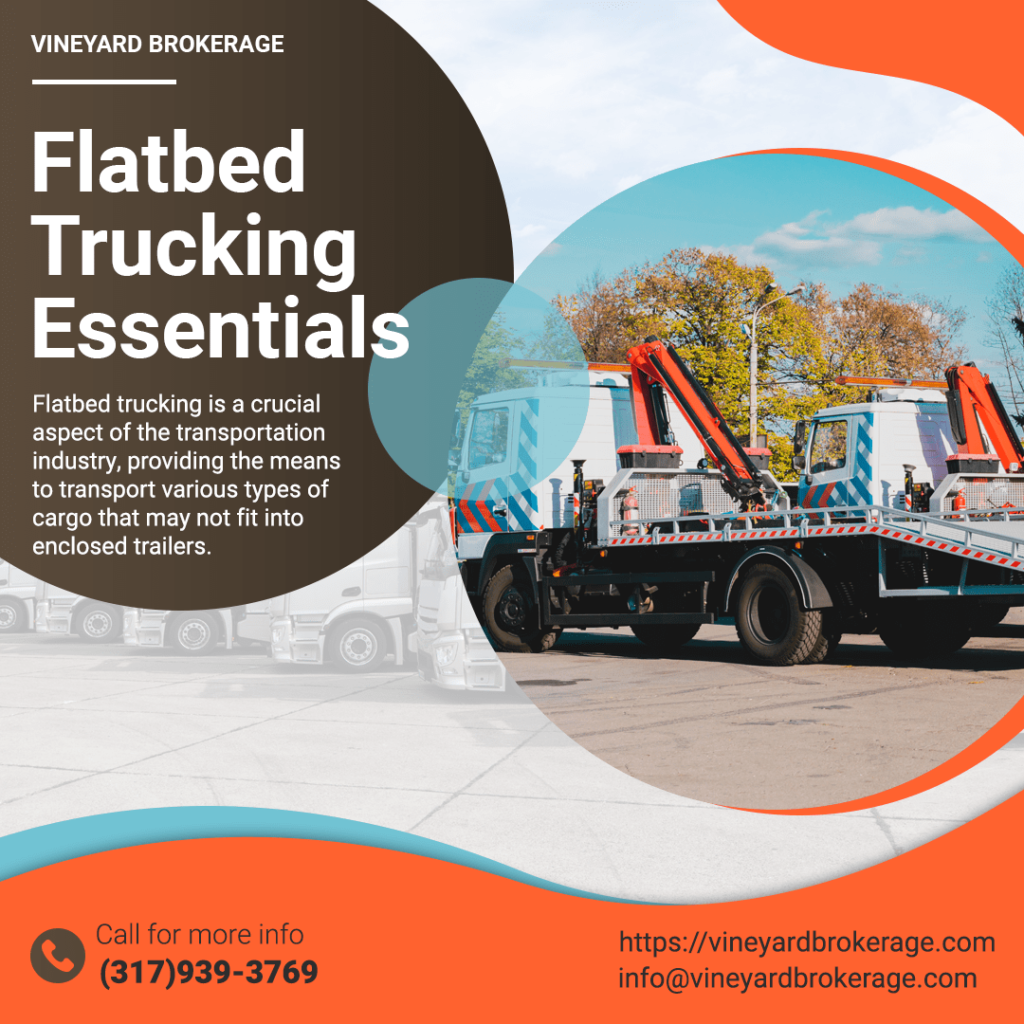Flatbed Trucking Essentials: Ensuring Safe Cargo Transportation

Flatbed trucking is a crucial aspect of the transportation industry, providing the means to transport various types of cargo that may not fit into enclosed trailers. However, to ensure the safe and secure transportation of goods, flatbed truckers rely on a range of essential equipment and tools. In this article, we will explore the necessary equipment, including tarps, straps, chains, binders, edge protectors, and load bars. We will also provide valuable tips and best practices for using and maintaining these tools effectively. Additionally, for all your flatbed trucking needs, Vineyard Brokerage stands as a trusted provider, offering reliable services at competitive rates. Contact us at info@vineyardbrokerage.com or (317) 939-3769 to experience our expertise in coordinating efficient and cost-effective shipments.
Tarps
Tarps are an essential element in the world of flatbed trucking as they provide crucial protection for cargo against adverse weather conditions. Various types of tarps, including lumber tarps, steel tarps, and coil tarps, are available to cater to specific cargo requirements. Proper tarping techniques, such as secure tie-downs and proper tensioning, are necessary to ensure the load remains protected throughout the journey. Regular inspections and maintenance of tarps are crucial to identify and address any tears, holes, or loose fasteners, thereby maintaining their integrity and effectiveness. By prioritizing the care and maintenance of tarps, flatbed truckers can ensure the safety and security of their cargo during transportation.
Straps and Chains
Straps and chains are essential tools in the arsenal of flatbed truckers, serving the critical purpose of securing cargo to the flatbed trailer. Heavy-duty ratchet straps and chains are commonly employed to provide tension and prevent any shifting of the load during transit. It is imperative for truckers to have a clear understanding of weight ratings, working load limits, and the proper attachment points to ensure secure cargo securement. Regular inspections of straps and chains are crucial to identify any signs of wear and tear, allowing for prompt replacement of damaged components. By prioritizing the maintenance and careful inspection of straps and chains, flatbed truckers can uphold optimal safety standards and ensure the successful transportation of their cargo.
Binders
Binders are indispensable tools in the realm of flatbed trucking as they serve the critical purpose of tightening chains securely and maintaining tension on the cargo. Lever binders and ratchet binders are the two common types of binders utilized by truckers. Selecting the appropriate binder, ensuring correct positioning, and conducting regular inspections are vital steps to prevent any load shifting during transportation. By adhering to these practices, flatbed truckers can enhance cargo security and promote safe and efficient transportation.
Edge Protectors
When it comes to safeguarding cargo edges from potential damage caused by straps or chains, edge protectors play a crucial role. Corner protectors and plastic sleeves are commonly employed to prevent abrasion and ensure the integrity of the load. By strategically placing edge protectors along the edges of the cargo, truckers can minimize the risk of load damage and enhance overall safety. This proactive measure safeguards the cargo and contributes to a successful and secure flatbed trucking operation.
Load Bars
Load bars, also referred to as cargo bars or decking beams, provide an additional layer of load stability during transportation. These adjustable bars fit between the sidewalls of the trailer, effectively securing the cargo in place. Load bars are particularly useful for stacked or multiple-tiered cargo, as they prevent load shifting and provide valuable support. By utilizing load bars, flatbed truckers can ensure that their cargo remains stable and intact throughout the journey, minimizing the risk of accidents or damage.
Tips and Best Practices
To ensure a safe and successful flatbed trucking operation, adhering to tips and best practices is paramount. Regular equipment and tool inspections are essential to identify any signs of damage or wear. Thorough pre-trip inspections should be conducted to verify the functionality of tie-downs, fasteners, and load securing systems. Properly securing and evenly distributing the load on the trailer is crucial for maintaining stability during transit.
Following manufacturer guidelines and industry regulations regarding cargo securement and load weight limits is of utmost importance. Truckers should prioritize training and educating their drivers on proper cargo handling techniques and the correct usage of equipment. By investing in driver training, flatbed truckers can promote safety and minimize the risk of accidents.
Maintaining a comprehensive record of inspections, repairs, and equipment replacements is vital to ensure compliance with regulations and effectively track maintenance schedules. By keeping detailed records, truckers can demonstrate their commitment to safety and provide evidence of their adherence to industry standards.
By incorporating these tips and best practices into their operations, flatbed truckers can enhance safety, protect their cargo, and uphold industry regulations. Prioritizing proper equipment maintenance, driver education, and compliance not only ensures the success of each trip but also promotes the overall reputation and professionalism of the trucking company.
For the best flatbed trucking services, consider reaching out to Vineyard Brokerage at info@vineyardbrokerage.com or call (317) 939-3769. Their expertise and network of owner-operators will provide reliable and efficient solutions for all your flatbed trucking needs.

